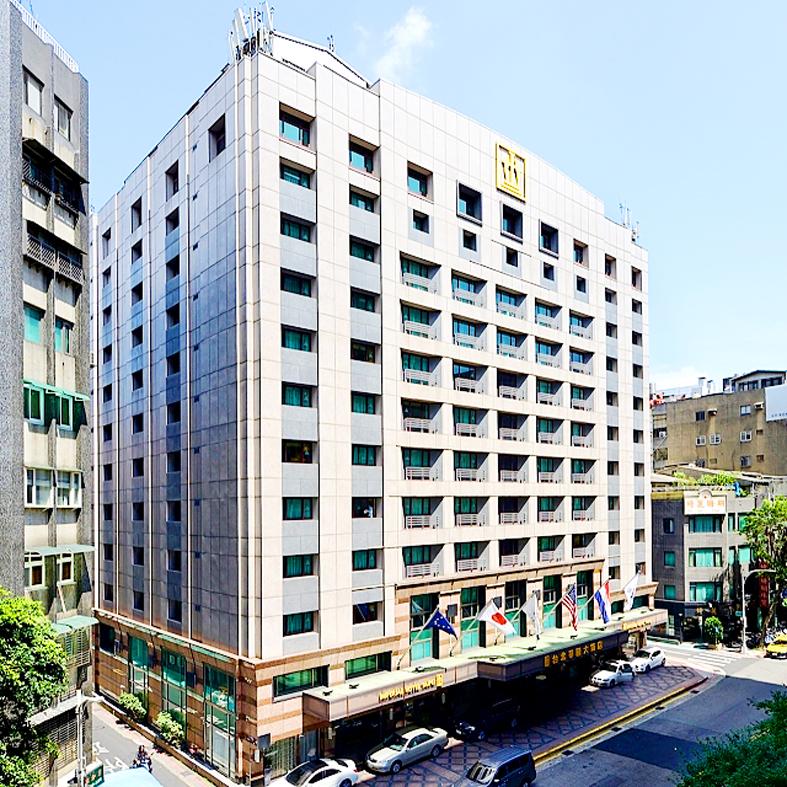Imperial Hotel Taipei (台北華國大飯店) is to shut down at the end of October, succumbing to a business decline induced by social distancing restrictions and border controls to curb a COVID-19 outbreak.
The five-star hotel with 326 guest rooms in the city’s Zhongshan District (中山) yesterday confirmed that it is to terminate its leasing contract with Taiwan Life Insurance Co (台灣人壽) as the outbreak wreaked havoc on its operations.
“We do not see a light at the end of the tunnel,” although the government has conditionally lifted the ban on dine-in services this month, while keeping a tight grip on gatherings and border controls, the hotel’s marketing head, Wu Yun-chia (伍允嘉), told reporters.

Screen grab from the Imperial Hotel Taipei Web site
The 50-year-old hotel and Taiwan Life Insurance decided to part ways after a court mediation last year failed to iron out their differences over rent concession terms.
Imperial Hotel tried to cope with the outbreak by turning the hotel into quarantine facility, but it has failed to curb losses.
A nationwide level 3 COVID-19 alert imposed on May 19 stifled domestic tourism, as well as food and beverage sales.
Although the Central Epidemic Command Center lowered the alert level to 2 late last month, people are still wary of dining out amid fears of lingering local infections.
Wu said Imperial Hotel is looking for a new location to keep its Chinese restaurant, famed for its roast duck cuisine, alive.
It will also press ahead with plans to open a new Imperial Hotel in a mixed-use complex integrated with the MRT Shihlin Station in July 2023, Wu said.
“Business might not improve in the next two years, so the hotel has opted out during the hiatus,” she said.
The backdrop allows the hotel to retain some employees and related details would be released by the end of this month, Wu said.
Formosa International Hotels Corp (FIH, 晶華國際酒店集團) chairman Steven Pan (潘思亮) said he was not surprised by Imperial Hotel’s exit, comparing the hospitality sector to a “critically ailing, but forgotten” patient.
The government has declined to provide wage subsidies as it did last year for hotels dependent on foreign tourists, even though the negative impact of the outbreak is much more serious this time, Pan said on the sidelines of the company’s shareholders’ meeting.
A proposed quintuple stimulus voucher program would be of little help to Taipei-based hotels, as people in the Greater Taipei area — who form the bulk of domestic tourists — prefer to travel to eastern and southern Taiwan, Pan said.
FIH shareholders approved the distribution of a cash dividend of NT$4.39 per share from the conglomerate’s profit last year of NT$733 million (US$26.17 million), or earnings per share of NT$5.18.
The results represented a 47.08 percent decline from a year earlier, dragged by the COVID-19 outbreak.
Pan was re-elected chairman at the board elections.

RUN IT BACK: A succesful first project working with hyperscalers to design chips encouraged MediaTek to start a second project, aiming to hit stride in 2028 MediaTek Inc (聯發科), the world’s biggest smartphone chip supplier, yesterday said it is engaging a second hyperscaler to help design artificial intelligence (AI) accelerators used in data centers following a similar project expected to generate revenue streams soon. The first AI accelerator project is to bring in US$1 billion revenue next year and several billion US dollars more in 2027, MediaTek chief executive officer Rick Tsai (蔡力行) told a virtual investor conference yesterday. The second AI accelerator project is expected to contribute to revenue beginning in 2028, Tsai said. MediaTek yesterday raised its revenue forecast for the global AI accelerator used

Taiwan Semiconductor Manufacturing Co (TSMC, 台積電) has secured three construction permits for its plan to build a state-of-the-art A14 wafer fab in Taichung, and is likely to start construction soon, the Central Taiwan Science Park Bureau said yesterday. Speaking with CNA, Wang Chun-chieh (王俊傑), deputy director general of the science park bureau, said the world’s largest contract chipmaker has received three construction permits — one to build a fab to roll out sophisticated chips, another to build a central utility plant to provide water and electricity for the facility and the other to build three office buildings. With the three permits, TSMC

The DBS Foundation yesterday announced the launch of two flagship programs, “Silver Motion” and “Happier Caregiver, Healthier Seniors,” in partnership with CCILU Ltd, Hondao Senior Citizens’ Welfare Foundation and the Garden of Hope Foundation to help Taiwan face the challenges of a rapidly aging population. The foundation said it would invest S$4.91 million (US$3.8 million) over three years to foster inclusion and resilience in an aging society. “Aging may bring challenges, but it also brings opportunities. With many Asian markets rapidly becoming super-aged, the DBS Foundation is working with a regional ecosystem of like-minded partners across the private, public and people sectors

BREAKTHROUGH TECH: Powertech expects its fan-out PLP system to become mainstream, saying it can offer three-times greater production throughput Chip packaging service provider Powertech Technology Inc (力成科技) plans to more than double its capital expenditures next year to more than NT$40 billion (US$1.31 billion) as demand for its new panel-level packaging (PLP) technology, primarily used in chips for artificial intelligence (AI) applications, has greatly exceeded what it can supply. A significant portion of the budget, about US$1 billion, would be earmarked for fan-out PLP technology, Powertech told investors yesterday. Its heavy investment in fan-out PLP technology over the past 10 years is expected to bear fruit in 2027 after the technology enters volume production, it said, adding that the tech would